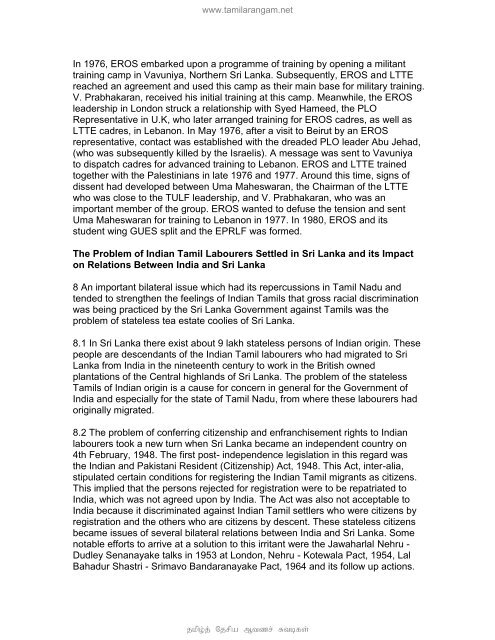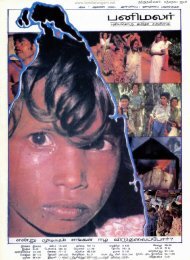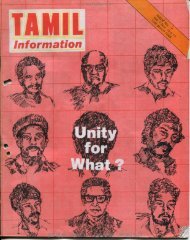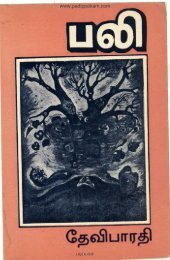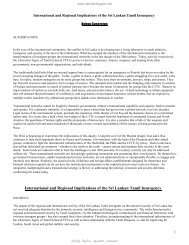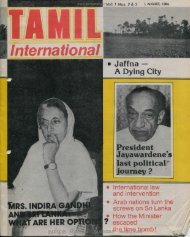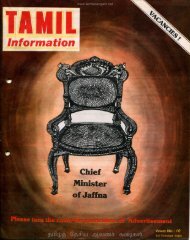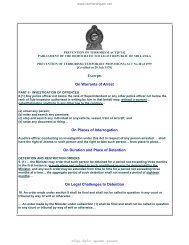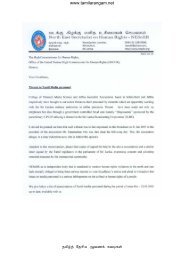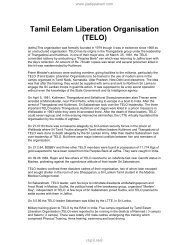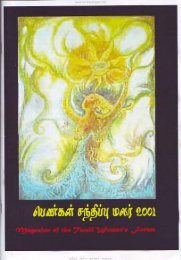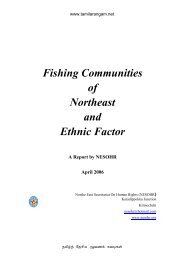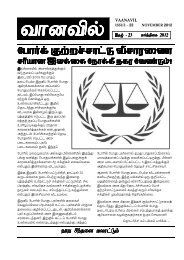Genesis of Ethnic Strife in Sri Lanka
Genesis of Ethnic Strife in Sri Lanka
Genesis of Ethnic Strife in Sri Lanka
Create successful ePaper yourself
Turn your PDF publications into a flip-book with our unique Google optimized e-Paper software.
www.tamilarangam.net<br />
In 1976, EROS embarked upon a programme <strong>of</strong> tra<strong>in</strong><strong>in</strong>g by open<strong>in</strong>g a militant<br />
tra<strong>in</strong><strong>in</strong>g camp <strong>in</strong> Vavuniya, Northern <strong>Sri</strong> <strong>Lanka</strong>. Subsequently, EROS and LTTE<br />
reached an agreement and used this camp as their ma<strong>in</strong> base for military tra<strong>in</strong><strong>in</strong>g.<br />
V. Prabhakaran, received his <strong>in</strong>itial tra<strong>in</strong><strong>in</strong>g at this camp. Meanwhile, the EROS<br />
leadership <strong>in</strong> London struck a relationship with Syed Hameed, the PLO<br />
Representative <strong>in</strong> U.K, who later arranged tra<strong>in</strong><strong>in</strong>g for EROS cadres, as well as<br />
LTTE cadres, <strong>in</strong> Lebanon. In May 1976, after a visit to Beirut by an EROS<br />
representative, contact was established with the dreaded PLO leader Abu Jehad,<br />
(who was subsequently killed by the Israelis). A message was sent to Vavuniya<br />
to dispatch cadres for advanced tra<strong>in</strong><strong>in</strong>g to Lebanon. EROS and LTTE tra<strong>in</strong>ed<br />
together with the Palest<strong>in</strong>ians <strong>in</strong> late 1976 and 1977. Around this time, signs <strong>of</strong><br />
dissent had developed between Uma Maheswaran, the Chairman <strong>of</strong> the LTTE<br />
who was close to the TULF leadership, and V. Prabhakaran, who was an<br />
important member <strong>of</strong> the group. EROS wanted to defuse the tension and sent<br />
Uma Maheswaran for tra<strong>in</strong><strong>in</strong>g to Lebanon <strong>in</strong> 1977. In 1980, EROS and its<br />
student w<strong>in</strong>g GUES split and the EPRLF was formed.<br />
The Problem <strong>of</strong> Indian Tamil Labourers Settled <strong>in</strong> <strong>Sri</strong> <strong>Lanka</strong> and its Impact<br />
on Relations Between India and <strong>Sri</strong> <strong>Lanka</strong><br />
8 An important bilateral issue which had its repercussions <strong>in</strong> Tamil Nadu and<br />
tended to strengthen the feel<strong>in</strong>gs <strong>of</strong> Indian Tamils that gross racial discrim<strong>in</strong>ation<br />
was be<strong>in</strong>g practiced by the <strong>Sri</strong> <strong>Lanka</strong> Government aga<strong>in</strong>st Tamils was the<br />
problem <strong>of</strong> stateless tea estate coolies <strong>of</strong> <strong>Sri</strong> <strong>Lanka</strong>.<br />
8.1 In <strong>Sri</strong> <strong>Lanka</strong> there exist about 9 lakh stateless persons <strong>of</strong> Indian orig<strong>in</strong>. These<br />
people are descendants <strong>of</strong> the Indian Tamil labourers who had migrated to <strong>Sri</strong><br />
<strong>Lanka</strong> from India <strong>in</strong> the n<strong>in</strong>eteenth century to work <strong>in</strong> the British owned<br />
plantations <strong>of</strong> the Central highlands <strong>of</strong> <strong>Sri</strong> <strong>Lanka</strong>. The problem <strong>of</strong> the stateless<br />
Tamils <strong>of</strong> Indian orig<strong>in</strong> is a cause for concern <strong>in</strong> general for the Government <strong>of</strong><br />
India and especially for the state <strong>of</strong> Tamil Nadu, from where these labourers had<br />
orig<strong>in</strong>ally migrated.<br />
8.2 The problem <strong>of</strong> conferr<strong>in</strong>g citizenship and enfranchisement rights to Indian<br />
labourers took a new turn when <strong>Sri</strong> <strong>Lanka</strong> became an <strong>in</strong>dependent country on<br />
4th February, 1948. The first post- <strong>in</strong>dependence legislation <strong>in</strong> this regard was<br />
the Indian and Pakistani Resident (Citizenship) Act, 1948. This Act, <strong>in</strong>ter-alia,<br />
stipulated certa<strong>in</strong> conditions for register<strong>in</strong>g the Indian Tamil migrants as citizens.<br />
This implied that the persons rejected for registration were to be repatriated to<br />
India, which was not agreed upon by India. The Act was also not acceptable to<br />
India because it discrim<strong>in</strong>ated aga<strong>in</strong>st Indian Tamil settlers who were citizens by<br />
registration and the others who are citizens by descent. These stateless citizens<br />
became issues <strong>of</strong> several bilateral relations between India and <strong>Sri</strong> <strong>Lanka</strong>. Some<br />
notable efforts to arrive at a solution to this irritant were the Jawaharlal Nehru -<br />
Dudley Senanayake talks <strong>in</strong> 1953 at London, Nehru - Kotewala Pact, 1954, Lal<br />
Bahadur Shastri - <strong>Sri</strong>mavo Bandaranayake Pact, 1964 and its follow up actions.<br />
jkpo;j; Njrpa Mtzr; Rtbfs;


